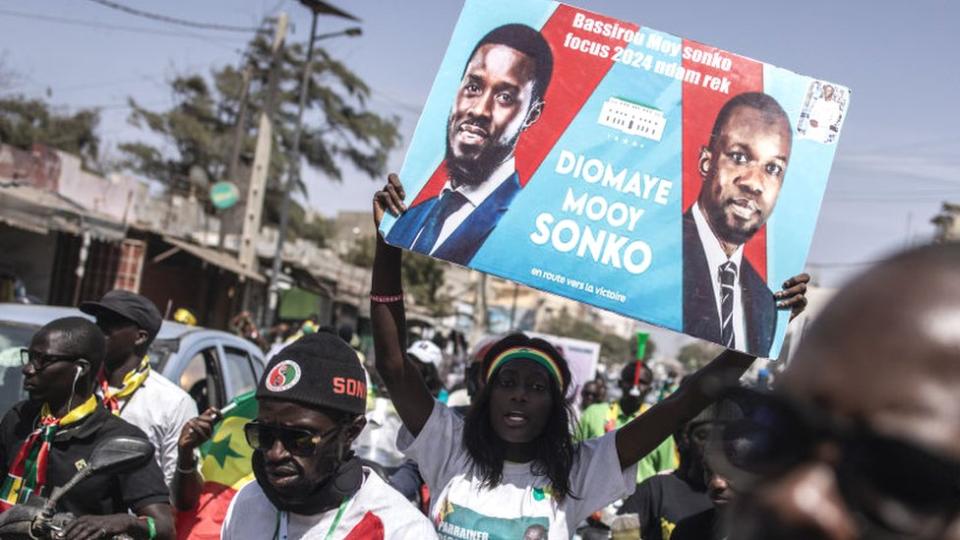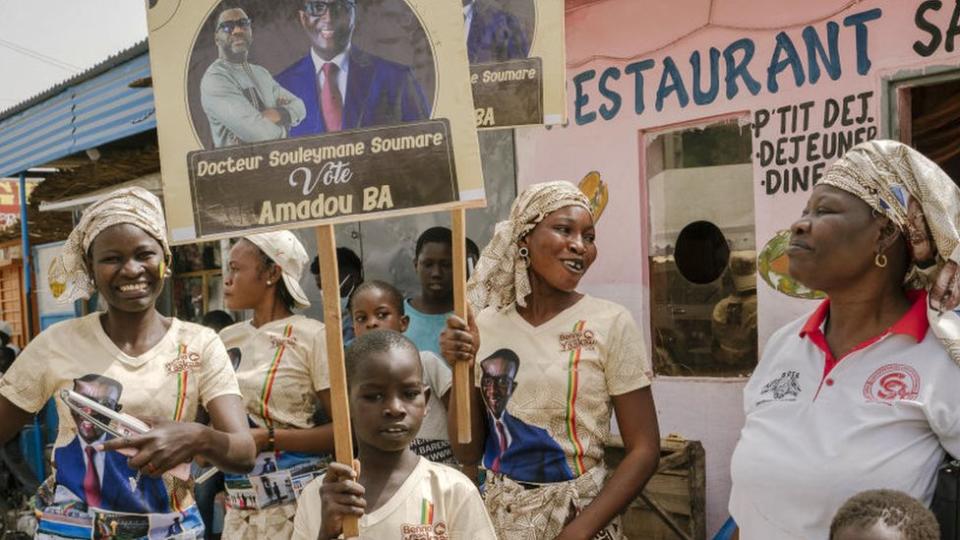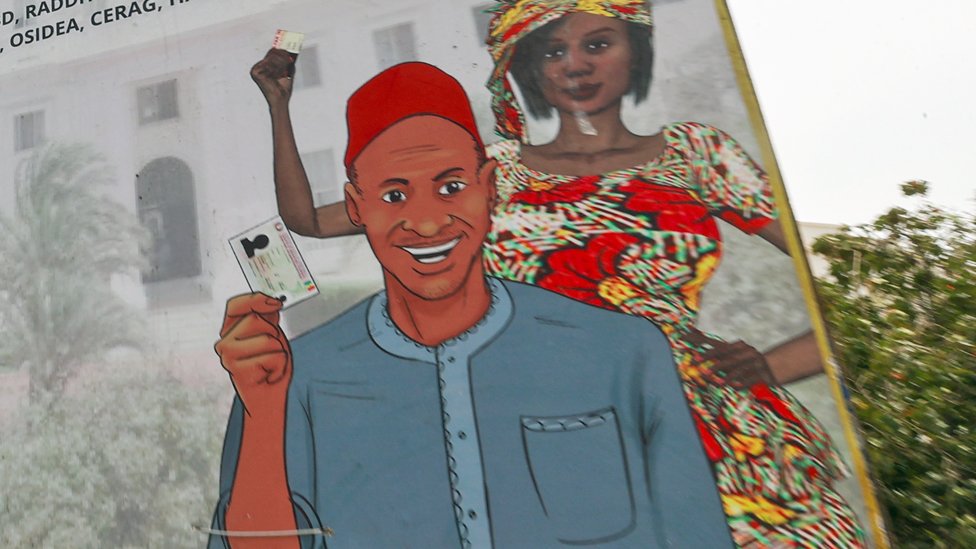Their rivalry underpins a massive divide and clash of outlook in the country, usually regarded as a beacon of democracy in West Africa, especially over its relationship with France, the former colonial power.
The poll is a rushed job – the date was announced with less than three weeks’ notice, following a month of confusion and violent protests.
What seems to unite most Senegalese is the anger directed at outgoing President Macky Sall who tried to postpone the election – originally scheduled for 25 February – until December.
Mr Sall has told the BBC he acted to protect the integrity of the vote after allegations of corruption and disputes over the eligibility of some presidential candidates.
However, critics accused him of seeking to extend his term in office or stop the clock to better prepare his candidate – which he denies.
It led to political turmoil, the intervention of the Constitutional Court, the president agreeing to leave office next month when his term officially ends, and a new election date.
Then last week, some of his fiercest critics – those involved in political protests over the last few years – were freed in a presidential amnesty in order to calm tensions.
This included firebrand opposition leader Ousmane Sonko, who came third in the last election and is hugely popular with young people eager for change.
But the 49-year-old is barred from running as a candidate this time, due to a series of charges he says were politically motivated.
Instead, he is throwing his considerable clout behind Mr Faye, who like him is a former tax inspector and was released from detention at the same time – he was awaiting trial on charges of defamation and spreading fake news.
The two met while working at the tax office and Mr Faye, who turns 44 the day after the election, was previously secretary-general of Mr Sonko’s Pastef party, which was dissolved by the government last year over allegations it had called for an insurrection.
Their slogan “Sonko is Diomaye, Diomaye is Sonko” has gone viral on social media in the last week.

The pair – greeted on their release by celebrating crowds – are pushing their anti-establishment vision for institutional reforms. It is an Afrocentric and nationalist agenda, including plans to renegotiate the country’s mining and energy contracts.
Mr Faye also wants Senegal to stop using the CFA franc – the West African single currency that is pegged to the euro, with the financial backing of the French treasury, and which is regarded by his supporters as a relic of the colonial era.
The proposal has been labelled as irresponsible by his opponents, although Mr Sonko has sought to quell such fears by saying they would seek to reform the regional currency first and only consider introducing a national currency if that should fail.
In contrast to this radical path, Mr Ba, prime minister until he resigned to contest the election, seeks to represent continuity and stability.
At his rallies, the 62-year-old has hit out at the former Pastef pair, labelling them “bandits” and saying a vote for him is a vote for “greater peace and prosperity”.
He argues his ministerial track record proves he will oversee development and create one million jobs in five years – as the staid statesman woos the youth vote.
Mr Ba may have been on the political scene for the last decade, but he is a bit of a closed book for most. He has tried to open up as a man of the people, revealing his love for reggae music and Bob Marley.
With more than half of Senegal’s population under the age of 25 and growing frustration over unemployment and boats full of migrants heading for Europe, it is an important demographic.


Arame Gueye Sene, executive director of the youth group Social Change Factory, told the BBC that young people were engaged in campaign issues, although the majority of the seven million registered voters were aged 35 and over.
“We see them on the streets, but we’re not sure that a lot of them are able to vote next Sunday,” she said.
A significant challenge for all candidates has been that the postponed election has fallen in the middle of the Muslim fasting month of Ramadan.
In Senegal, 95% of the population is Muslim and consequently key cities like the capital, Dakar, and Thiès are unusually quiet for an election campaign.
People tend to save their energy until they break their fast at sunset, meaning candidates are having to rethink their campaign strategies.
Booklets detailing proposed policies have been shared online, as well as live recordings of rallies.
“We have to double efforts to mobilise voters,” Anta Babacar Ngom, a business executive and the only woman in this race, told the BBC.
Candidates are still making an effort to tour the country – as Mohamed Ly, a member of Khalifa Sall‘s campaign team, said that undecided voters could prove key.
Mr Sall, the 68-year-old former mayor of Dakar and no relation to the president, is one of two candidates who could prove a kingmaker or push the vote into a second round. To win outright, a contender must obtain more than 50% of the vote.
The other such candidate is Idrissa Seck, the 64-year-old former mayor of Thiès. Both have loyal followings.
Another influential player is Karim Wade. The 55-year-old is the son of ex-President Abdoulaye Wade, though his candidacy was rejected as he had not renounced his French citizenship in time – electoral laws do not allow for dual nationality.
His Senegalese Democratic Party (PDS) has not put forward an alternative candidate but has traditionally benefitted from the support of the Mourides, the most influential Muslim brotherhood in Senegal. If it publicly backs one of the candidates, that could prove decisive.
Most of the electorate may feel bruised by the upheaval of the last month but electoral directorate head Birame Sene is confident they have nothing to worry about.
He told the BBC everything was in order and well prepared for Sunday’s vote – when Senegal’s much-vaunted democratic values will be put to the test.
